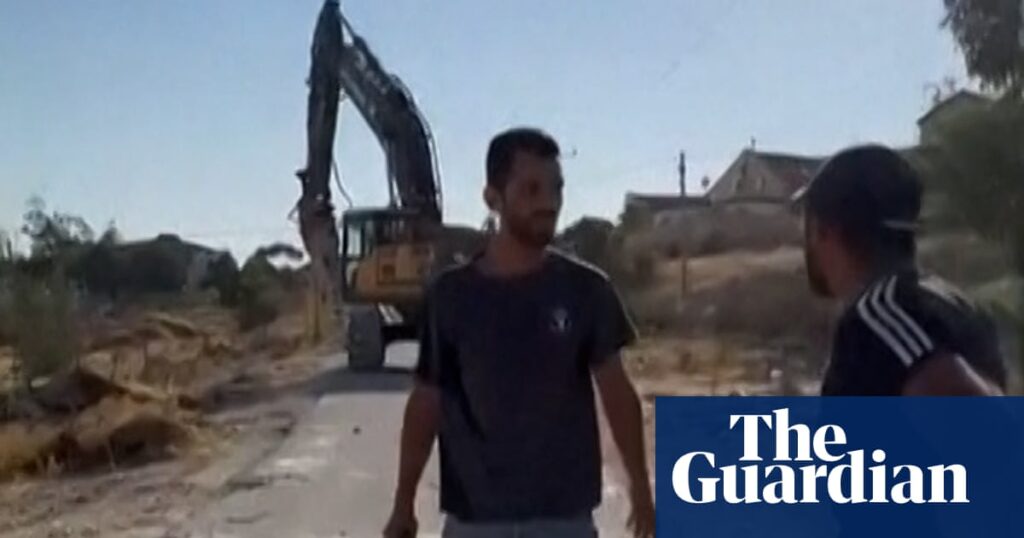Israeli police have refused to release the body of Awdah Hathaleen, a Palestinian activist and journalist who helped make the Oscar-winning documentary No Other Land, while the settler accused of killing him, Yinon Levi, has been released from custody.
Hathaleen was shot to death on Monday night during a confrontation between settlers driving a bulldozer in the village of Umm al-Kheir in the occupied West Bank and residents of the town. A video appears to show Levi firing his gun wildly and then people screaming as Hathaleen, standing a distance away in the town centre, collapsed.
Levi was released from custody by a court on Tuesday and placed under three days of house arrest, which ends tomorrow and allows him to roam free. According to Levi’s lawyer, Avihai Hajabi, the court found that there was evidence supporting his claims that he acted in self-defence, and ordered his release.
Levi, who was put under sanctions by then US president Joe Biden and later removed from the sanctions list by Donald Trump, could still face charges.
Despite the release of Levi, Hathaleen’s family is still struggling to recover his body from Israeli police so that they can hold his funeral.
“It’s devastating. His body is still being held and the killer is free. His mother and his wife – they keep asking where he is, when his body will come back. I have no answers anymore. I tell them an hour, two hours, but I don’t know,” said Salem Hathaleen, the elder brother of Awdah.
Israeli police said that they will not release Hathaleen’s body until his family agrees to ten conditions, including limiting the funeral to 15 people and burying his body outside his birth village, according to a lawyer representing the family.
“The idea is that the police want the funeral to be really small and quiet, so that it is like it never happened and nobody will come,” said Karin Wind, who has reviewed the conditions and is communicating with the police on behalf of the family.
According to a police document seen by the Guardian, police requested that no “signs calling for incitement” be displayed or “amplification” system used at the funeral, with the police requesting a deposit from the family to ensure they comply with conditions. The family refused to sign the document and its conditions.
“Fifteen people – this would mean basically half his siblings and children couldn’t even attend,” said Salem.
The Guardian reached out to the Israeli police and the military for a comment but did not receive one by the time of publication. The Israeli military has claimed the conditions are necessary to preserve public order.
Israeli soldiers raided the tent erected for mourners on Tuesday, declaring it a closed military zone as they pushed mourners out and threw stun grenades at activists and journalists in attendance.
“Coming to the place that he was killed, where they killed him, and kicking people out? This is not a life, this is against any law in the world,” said Alaa Hathaleen, Awdeh’s brother, who witnessed him die.
The Guardian attempted to reach Alaa Hathaleen for a comment on Thursday but discovered he had been arrested, along with 13 other residents, by the Israeli military.
More than seventy women from the village declared on Thursday that they were going on hunger strike until the police return the body of Awdeh Hathaleen.
Activists and relatives of Hathaleen said the case underscored what they called a system of impunity for Israeli settlers as they commit a wave of violence against Palestinians. At least 1,010 Palestinians have been killed and more than 7,000 have been injured in the West Bank by Israeli settlers and soldiers since October 2023.
On Thursday morning, another settler attack was carried out in the village of Silwad in the West Bank. The Palestinian Authority said Israeli settlers descended upon the village and set fire to homes and cars in the village, killing a Palestinian man.
“Forty-year-old Khamis Abdel-Latif Ayad was martyred due to smoke inhalation caused by fires set by settlers in citizens’ homes and vehicles in the village of Silwad at dawn,” the Palestinian health ministry said in a statement.
The Israeli military said in a statement to Agence France-Presse that several suspects set fire to property and vehicles in Silwad, but that they were unable to identify the suspects. The Israeli police said it had launched an investigation into the incident.
Accountability for settlers who commit acts of violence against Palestinians is rare. Israeli settlements are considered illegal under international law, but their development has been accelerated under the current right-wing government.
The Israeli government distributed 29 all-terrain vehicles, in addition to security and logistical equipment including drones and night vision goggles, to settlements on Wednesday. At the ceremony to hand over the equipment, finance minister Bezalel Smotrich said: “The agricultural farms and young settlements are the spearhead of Zionist settlement in Judea and Samaria.”
The killing of Hathaleen prompted a wave of international condemnation. The French ministry of foreign affairs released a statement urging the Israeli government to hold Hathaleen’s killer accountable and calling settler violence “a matter of terrorism”.
Umm al-Khair is within Area C of the West Bank, which is under full Israeli control and sits just below the Israeli settlement of Carmel. All settlements in the West Bank, which Israel has occupied since 1967, are illegal under international law.
“There’s a saying here: ‘The dignity of the dead is in burial.’ When someone is killed, there should be immediate burial. It brings some small relief to the heart. But until now, we’ve received neither the body nor the right to do anything,” said Salem.


